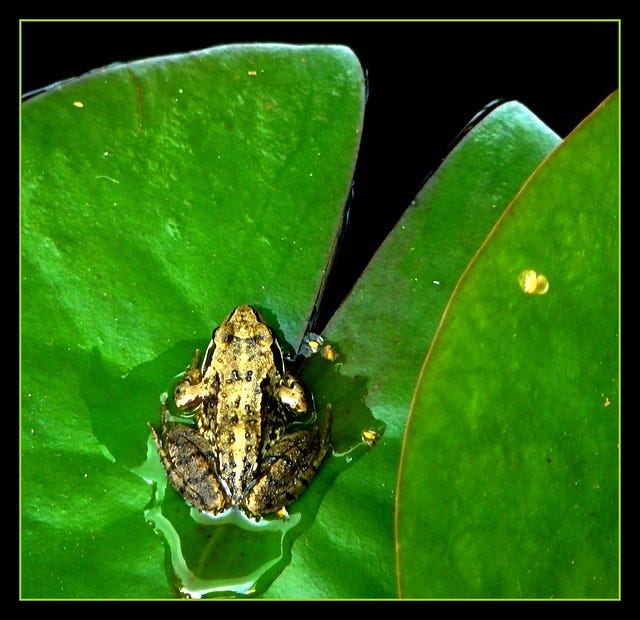The Hanged Man: Part 6: Ostara
Post #48: In which Death dances ...
(If you are a new subscriber, you might want to start at the beginning of The Hanged Man. If you prefer to read Part 6 in its entirety, go here. For the next serial post, go here.)
MARY
Mary listened to Baba Yaga’s stories and watched the unfolding scene with fascination, pity and horror. She felt like an outsider. Kunik was her only connection among the initiates, but the other girls were clearly friends. Obviously, Vasilisa and Artyom shared some kind of history, and Artyom and Radulf were evidently friends. The revelations in Baba Yaga’s stories had nothing to do with her, and she wouldn’t have chosen to be an audience of such painful discoveries — not if she’d been given a choice.
She wondered uneasily what was coming next.
Baba Yaga had taken control and was choreographing the next part of the initiation, but the man Artyom did not go with the other men to the far fire. He stood, glowering at Baba Yaga, radiating rage and, Mary thought, spoiling for a fight. He made her nervous.
Artemis threw something on the fire, and the smoke of its burning made Mary feel strange. For a few minutes, she forgot her distress and Artyom’s obdurate presence. Baba Yaga was drumming, and the insistent sound captured Mary’s attention. When she thought to glance again at Artyom, he was gone.
From outside the fence came the sound of piping, as though the piper had been waiting in the shadows to join Baba Yaga’s drum. Drum and flute spoke to one another briefly. For a few moments, each struggled to lead, to dominate, and then gradually each relaxed into its own rhythm, and the two rhythms began to flow together, aggressively individual but weaving a reluctant melody all the same. Mary’s blood thickened and burned. She knew the sound of that flute.
Something moved at the gate in the fence of bones, just outside the firelight. They heard the “snick!” of the gate latch as it closed behind the piper, and he was there.
Around his shoulders swirled a crimson cloak, decorated with points and sparks of light. At the shoulder of the cloak a warm golden glow radiated, as though a candle burned there. The cloak revealed and then concealed goat legs, dark-haired and ending in cloven hooves. The piper moved lightly, holding the flute to his lips. When seen silhouetted against the firelight, two pointed horns thrust out from his hair.
He turned and swayed from a supple waist, dancing to the flute and yet keeping the drumbeat with his feet as well. As he turned, Mary saw his erect phallus and felt a blossoming of heat in her belly. A drop gleamed on the tip of his erection and her own body responded in a thick, oily slide of drops down the inside of her thigh. The heavy smell of the burning herbs muffled her thoughts, but woke her body.
Then Death came clinking and jangling, high stepping and shuffling to the music. Baba Yaga threw back her head and shrieked at the night sky and the stars shivered, flickering uneasily. Death jitterbugged into the circle of firelight that revealed ivory and shadow, ivory and shadow, as he gyrated and danced. His bones were bare and dry, clacking, rubbing together like naked branches in a wind. He stepped in front of Nephthys, who jumped to her feet. They faced each other, the ancient-eyed child in her rags and gleaming golden earrings, and the bony skeleton. Death bowed elaborately. Nephthys mimed a curtsey. The piping swung into a wild waltz and Death and Nephthys revolved, macabre and barbaric, around the fire.
The piping died away and the dancers revolved more and more slowly, ending in an unexpectedly graceful movement. Death bowed over Nephthys’s hand, turned her palm up, and pressed his teeth against it. Nephthys rested her other hand on the bald dome of his skull for a moment, as though in silent blessing, and then dropped it at the same time Death released the hand he’d …kissed?
Death spun in a quick, graceful arc of ivory and shadow and looked directly at Baba Yaga. The Baba pointed at Mary with her drumstick. “That one,” she said with cold clarity. “That one is yours.”
Mary gasped, heart accelerating into painful, labored pounding. Her breath quickened with fear.
“Death for you, Girl,” screamed Baba Yaga. “Death within you and Death from your hand! Murderer! Slayer!”
“No!” screamed Mary. She was life! She was the Seed-Bearer, the nurturer, the one who blessed! The sullen fire threw maniacal shadows. Mary’s mouth was dry, her head thick. Baba Yaga’s distorted shape loomed over the skull drum between her legs.
“Black cunt! Bitch! Whore!” shrieked Baba Yaga. “I name you Death-Bringer! I name you Goat-Sucker! I name you Chalice of Blight, of Pestilence, of Decay!”
Mary threw back her head and screamed in denial, the Baba’s mocking laugh mingling with it. As she looked into the hag’s gleeful face, Mary had a sudden, overwhelming perception that she saw a reflection of herself. Her youth, her beauty, her nurture was also this aged, hideous aspect, so powerfully, vitally alive. In fact, it seemed to her Baba Yaga commanded the greater primordial power of life.
“Be silent!” spat Baba Yaga.
Mary swallowed her hysteria with an effort. The fire murmured hotly. The fragrant smoke wrapped her like a blanket. Death stood easily, empty-eyed, in front of her. Baba Yaga pulled out a slim, sharp knife with a handle of bone.
“If you’d be a Seed Bearer you must also deal in death,” said Baba Yaga. All madness vanished from her voice. She spoke coldly and clearly, holding Mary in her iron gaze. “Seeds grow in death. Show the seeds you’re worthy. Prove yourself. Give them a little drink of blooood!” Her voice dropped to a coaxing, playful singsong.
From the shadows threaded an inviting melody. It bubbled and trickled like a rivulet of shining water in the sun. It was innocent, promising play and laughter. The rabbit, Surrender, crouched at Baba Yaga’s feet. Ears pinned, eyes wide and reflecting light, it huddled, looking paralyzed with terror.
The music coaxed and beckoned, and Surrender began to drag himself toward Mary, trembling and reluctant. Inexorably caught in the net of music, he came, inch by inch. For a moment Mary felt frozen with horror. The rabbit’s terror was a palpable presence, like a stench of death and suffering, a clogging darkness in the clean night. The music was a cold-eyed thing without mercy and the gentle creature, the lonely little rabbit Kunik called into being from her agonized youthful dreams, was powerless.
Power. Choice. Consent. Mary turned abruptly on her heel, strode to the Baba and snatched the knife out of her hand. She picked up Surrender with firm hands. In a quick, sure stroke, she drew the knife across his throat. He kicked, dying, ears soft in her hand. She dropped his warm body into the empty cauldron, went to Nephthys’s cloth and carefully gathered up the packages and bundles of seeds. She let them fall onto Surrender’s body, now lying in a pool of blood.
She looked down into the cauldron’s shadows for a moment, thinking of blood and seed, death and dark earth. She raised her eyes resolutely to Baba Yaga’s face, feet planted firmly, legs slightly apart, back straight. The piping changed from the coaxing death melody to a wilder, more passionate cascade of notes, leaping and savage. The arousal in her flesh was not distracted by her bloodletting, was perhaps even strengthened by it, and she exulted in her own eroticism, opening and swelling in fierce desire, boldly holding Baba Yaga’s gaze, wanting her to know.
The piper’s notes moved against her flesh. Life and death for the cauldron. Life fed death and death fed life. The inescapable rich rightness of it was like the smell of blood on her hands.
The piper came nearer and nearer, until he stood beside her, his music demanding, lubricious. She didn’t look away from Baba Yaga. She raised one hand to her mouth and licked blood from it deliberately, smearing her lips with sticky wetness. Her mouth filled with the metal taste of blood.
“Enough!” screeched the Yaga. The piping stopped. She regarded the two of them with a curled lip, glancing back and forth between their faces.
“Hhmmpphh,” she said, pleased, and yet not so pleased. “Hhhhmmmmpppphhh.” She stood for a moment with an inward look of concentration and then spat explosively at their feet. Mary felt the spray of spittle on her skin and mentally recoiled, but willed herself to remain motionless. In the firelight, a thick blob of spit rolled down the piper’s cloven foot. The Baba turned and stumped away.
Mary’s knees weakened and she swayed. The piper flung a heavy cloak over her shoulders, gleaming with beads and golden thread, and his strong arm encircled her. He took her to a place just outside the reach of firelight and let her sit down. She put her face in her hands and smelled blood again, retched, and let the tears come.
VASILISA
Vasilisa danced. The sound of the Baba’s drumming beat in her blood, insistent, demanding, somehow mocking. Flames flickered at the edges of her vision. Her maimed bare foot stamped down on the ground. It ached, as it always did when she went barefoot or walked heavily. The drumbeat compelled her feet and she danced, danced hard, feeling the blows of her feet on the ground through knees and hips. Her thoughts were thick, far away behind the strong-smelling smoke. At the same time, she felt more present in her skin than ever before. Nice, the thinking part of her said with numb lips. Sweet. Forgive. Compassion. But the words were too much effort, and as they slowed and fell away, she was surprised to find rage. So, she danced, hating herself, hating her pain, hating her deformed foot and most of all, hating Artyom.
She heard the insinuating, trickling melody and saw Surrender dragging himself on his belly to Mary. She watched Mary take the Baba’s knife and go to meet the helpless creature. She knew what would happen, knew what must happen, and it seemed to her that same melody had played inaudibly the whole time she’d been a frog. Coaxing, inviting, pretty. A sweet melody of hopefulness and invitation. Yet it wasn’t sweet at all, was it? Surrender cringed, terrified, eyes bulging, ears pinned. He didn’t want to go to Mary, but he must go, though he went to his own death. The drumming stopped and the piping climaxed, changed abruptly into something rampant and somehow lewd.
The drumming began again, settling into a steady pulse like a heartbeat. All the madness went out of it. Nephthys sat in Baba Yaga’s place, beating the dome of the skull between her knees. The Baba stood in front of Mary and the piper in his sweeping crimson cloak. Surrender was gone.
Vasilisa turned her eyes away and danced. The grinning figure of Death leapt in front of her. In one bony hand, he held a vicious pronged tool with sharp points. He twirled it at her and she recognized a frog gig. The piping began again and Death grinned, gyrating and stamping in the same rhythm her own feet followed. He raised the gig and danced toward her, moving his hips seductively.
Red, scalding rage bloomed in her. She opened her mouth and screamed, knocking the thing from Death’s hand with all her strength. It fell and she bent swiftly, picked it up and drove it at Death. It hit a rib, turning in her hand as it slid along the bone, and lodged in the sternum. Death danced backward, still grinning, reached up and pulled it out.
Again, she knocked it flying from his hand, bent, found it among the young spring growth. She stabbed at him, dancing to the inexorable beat, her tortured foot throbbing and hot.
Again and again, she stabbed, feeling rage as she’d never felt it before. Death grinned, moving and turning just out of reach, teasing, jeering. She screamed and swore, making her throat raw. She realized she was crying. She’d kill him! She’d pierce him a thousand times and watch his blood flow out. She’d lick it from his arms, his face, his chest. She’d kill him one jab at a time. She lusted for his pain, his groans. His agony would feed her. She’d tear open his guts, an inch at a time, and spit into the wound. She’d pin him to the ground like a frog, like a rabbit, like her own poor foot… She jabbed the gig into the empty eye socket and it stayed there, jutting straight out from his face, as though held by the ghost of the long-absent eye. He didn’t care. No blood. No flesh. He was beyond agony, beyond her ability to hurt him. He danced away from her, taking the gig with him, leaving her drained and unsatisfied.
The piping stopped but now Baba Yaga drummed again, the hag and the child Nephthys bending together with their sticks.
Vasilisa gasped for breath, trembling on her feet. She thought of Artyom and gagged, remembering the smell of his vomit and the feel of it under her bare feet. Abruptly, her rage receded, leaving her feeling empty and slack. A hand came down on her arm and she turned blindly and saw Artemis’ calm face.
“Come,” she said, and Vasilisa obeyed, too weary to do anything else.
Artemis sat comfortably with her back against the bone fence. Above her, impaled on a post, grinned a fiery skull.
“Sit,” she said. “Now is time for more hidden things.”
Vasilisa dropped to the ground and put her face in her hands.
“The worst is over,” said Artemis.
Vasilisa let her hands drop and leaned her head wearily against the fence. “What now?” she asked flatly.
“Who told the story of the frog and the neglected young prince?
“Baba Yaga,” Vasilisa said.
“And who’s inside her story?” asked Artemis.
“I am. And…Artyom.”
“How would Artyom tell the story?”
“I don’t know,” said Vasilisa, surprised. “I hadn’t thought of it.”
“Can Baba Yaga tell the story from his point of view?” asked Artemis.
“No. She can only tell from her point of view,” said Vasilisa bitterly. “And she did!”
“She did,” agreed Artemis neutrally. “But only Artyom can tell his story. And inside the Baba’s story is also your story.”
“Oh,” said Vasilisa, surprised.
“Would you tell the story the way Baba Yaga did?”
“No, of course not. My story would be about Artyom and her.”
“That’s right. Baba Yaga’s story revealed hidden things to you, to Artyom, and to the rest of us. But it didn’t go far enough. Within that story are more hidden things. What’s hidden in your story, Vasilisa? What’s there, asking to be seen?”
Vasilisa felt harried and exhausted. It was an effort to think. She wanted to sleep, find a dark safe place somewhere and forget… She realized she was going to cry — tried to stop — couldn’t — and decided she was too worn out to be proud. She let the tears come.
“Baba Yaga’s right. I’m so sweet! I’m always so sweet! I hate the way she makes me see myself! But I want to be kind and compassionate. I want to give people a second chance. It’s good to see the best in others, isn’t it? Isn’t that the way we’re supposed to be? But… he did that to me. He did that — on purpose! How could he do that? How could he be so vicious?”
She cried, confusion, rage, pain and humiliation a bitter clot in her throat. Artemis made no comment.
Vasilisa wiped her face with her apron and blew her nose.
“There’s nothing wrong with kindness and compassion,” said Artemis. “But shouldn’t your first kindness and compassion be for yourself?”
“Myself,” said Vasilisa.
“He hurt you, Vasilisa. You knew you weren’t safe with him. Did you owe him kindness and compassion at your own expense?”
“No,” said Vasilisa uncertainly. Then, with more force, “No, of course not. That can’t be right!”
“No,” agreed Artemis. “If you’d kept yourself safe after he hurt your foot, if you’d acknowledged the betrayal and done whatever was necessary to keep yourself safe… “
“He’d never have been able to get near enough to pick me up and throw me against the tree,” finished Vasilisa.
“He did wrong,” said Artemis, “and you don’t know what kind of a price he’s paid, but tonight did he behave like a man at peace with himself?”
Vasilisa didn’t answer because there was no need to. They’d all been witness to the stink of Artyom’s wretchedness.
“You’re not responsible for his choices,” said Artemis.
“But I let him,” said Vasilisa. “I was part of it. I allowed it to happen. That part is my responsibility.”
“A hidden thing,” said Artemis.
Vasilisa gave a tired half sigh, half sob. Artemis reached out and clasped her hand and they sat together, leaning against the bony fence. The skull over them dimmed its light. Firelight flickered from the bonfire in the center of the circle. Someone put wood on it. Vasilisa, looking through the flames, could look right under Baba Yaga’s house on its tall chicken legs and see the bonfire on the other side where the men gathered. She wondered remotely what they were doing and if Artyom felt as worn out as she did.
(This post was published with this essay.)







